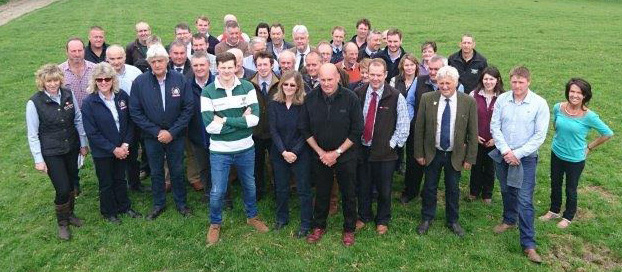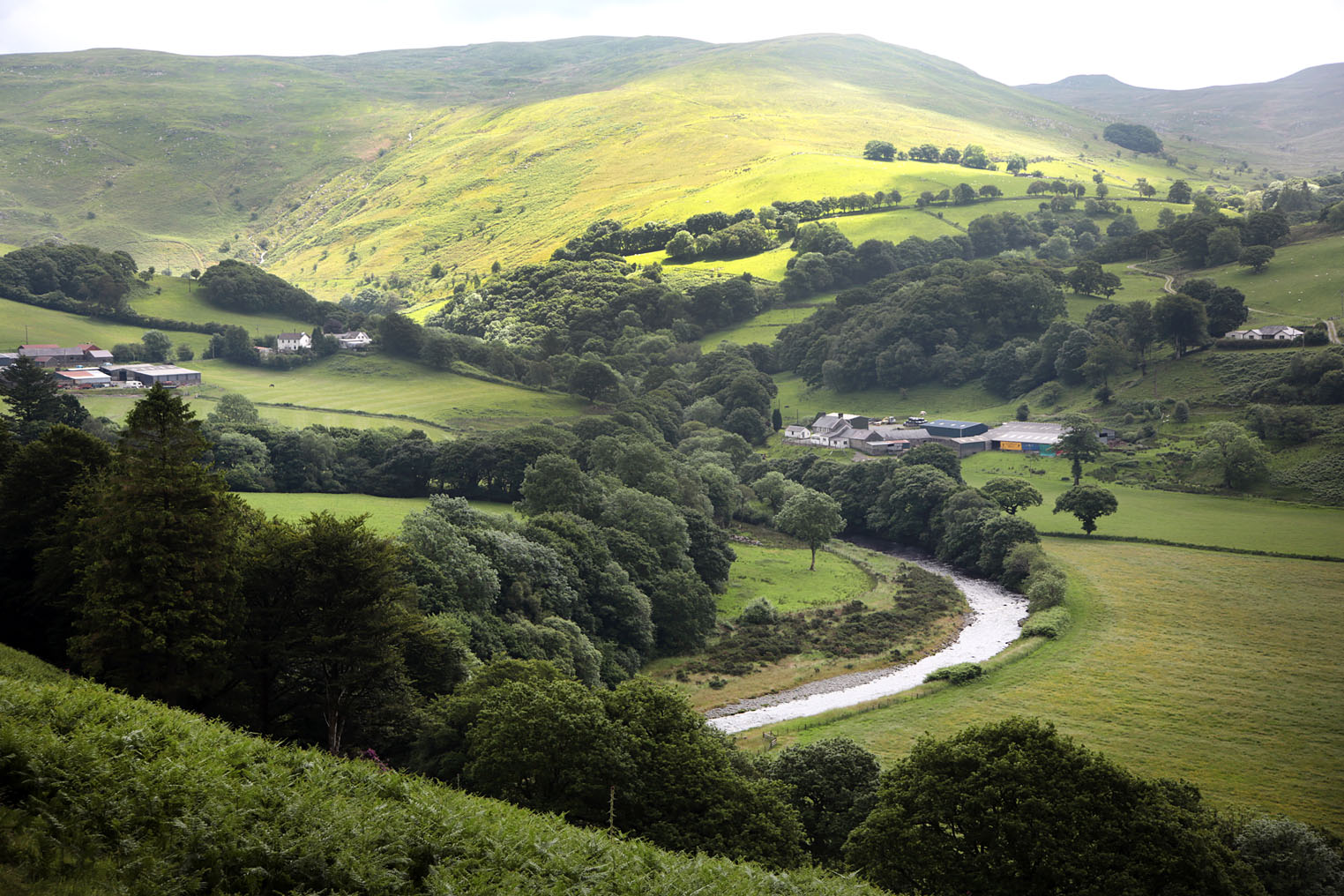Farming
FUW puts spotlight on rural economy

 HOW MANY businesses are involved in the running of a farm and how many people are directly and indirectly employed by the agricultural sector?
HOW MANY businesses are involved in the running of a farm and how many people are directly and indirectly employed by the agricultural sector?
How reliant is the rural community really on farming? Those were the questions the Farmers’ Union of Wales asked recently.
We often think about the obvious options, such as feed merchants, sales and auctioneers businesses, farm contractors etc. but how much does just one farm really contribute?
To try and answer these questions Mid Wales farmers John Yeomans, his wife Sarah and son Joe, recently hosted an event that put the spotlight on the importance of agriculture in the rural economy, at their farm Llwyn y Brain, Adfa, near Newtown.
A survey of the businesses that the Yeomans family deal with revealed 2,347 jobs at local and Welsh level and also 225,980 at a wider national level were dependent on the survival of those businesses.
On the farm, the Yeomans family run a herd of 73 cows consisting of pedigree Limousin, Limousin x, Belgian Blue x, and 15 homebred replacement heifers (closed herd).
They further keep 495 ewes which are mainly Beulah and 160 Beulah ewe lambs and the flock has been closed since 1981.
The couple sell Beulah draft ewes and some yearlings, as well as Welsh Mule ewe lambs for breeding and sell finished lambs on a deadweight basis
The 232 acres of owned farmland sit between 750 feet to 1420 above sea level, with 100 acres (34.8ha) of lower land and 132 acres (53.4ha) of largely improved hill land.
A further 53 acres of additional land is rented.
John, who was keen to explore the wider economic impact his business has on the wider rural economy, said: “Following the downturn in agriculture over recent times and across almost all sectors, I wanted to help highlight the importance of a thriving agricultural sector on the economy – both locally and much further afield.
“Farmers are an exceptional conduit for money, so if their businesses are thriving they reinvest and this, in turn, brings wealth and good fortune to others.
“The difficult times we are facing are clearly already impacting on our ancillary and support industries and businesses.
“With this in mind, we were pleased to put the spotlight on all the businesses – both local and further afield – that have some stake in our survival. Our relationship with these businesses is symbiotic and crucial to both our successes.”
BUSINESSES
ANSWER THE CALL
The event was attended by an array of local businesses and representatives such as Agri-Advisor, Agrimin, Bibby’s, Alpha Plumbers, FUW Insurance Services Ltd., E W Bumford & Co, RVW Pugh Ltd, I Jerman, Binding Tyre Services, Countrywide, Westflight, Morris Marshall and Poole, British Wool Marketing Board, Wynnstay, R G and G R Francis, McCartneys, OPICO, Sainsbury’s, Genus, KiwiKit, Dunbia, E George & Son, Dow AgroSciences, Trefaldwyn Vets, Zoetis, Shearwell Data and HSBC, who play a role in John and Sarah’s daily business routine.
Mr Yeomans said: “I must thank the businesses who came to support the event and those that responded to our short survey for the valuable contribution they make to our business and the wider rural economy.
“Supermarkets and slaughterhouses are just as important in our business as our local garage.
“Over 22% of the employment in Wales is linked to farming or food in some way, so it is worth noting the important role we all play in keeping our economic powerhouse going.
“Individually we may not be making a fortune for our solicitor, bank, garage or anything else. But together we are an important force.
“We hope days like this will help to get the message across about the connection between British food and the many businesses connected to it, why it is worth supporting your local farmer and how much of a difference each individual can make in terms of giving back to the local economy.”
THE ELECTRICAL WHOLESALER
City Electrical Factors (CEF) are one of the businesses the Yeomans family trade with. C.E.F. are a national Electrical Wholesaler supplying businesses the length and breadth of the UK.
The Newtown and Welshpool branches sit in the heart of Mid-Wales and as such are two of the most rural branches in the C.E.F. network.
Across these two branches the company employs 11 staff, and nationally they employ about 2750 members of staff.
Darryl Owen, manager of the two branches, said: “I feel it’s very important to employ local people to serve local people. Many of my staff have strong links to the local agricultural and Farming community.
“For us, in such a rural area, any downturn in agriculture has a serious knock on effect to our business and turnover in Newtown and Welshpool.
“It is not just the direct effect from farming businesses but indirectly through the Electrical Contractors who serve this market sector. We service a very wide and diverse market sector which can all be affected by any downturn in the Farming community.
“Many small industries in Mid- Wales are reliant on a strong agricultural customer base. If these small business begin to struggle they stop spending and that’s a big issue for us.
“The on-going success of C.E.F. in Mid-Wales is undoubtedly linked to the success of our agricultural community. Any effort or campaign that will highlight the importance of a healthy rural economy will definitely have my support.”
MACHINERY SALES
RVW Pugh Ltd, an agricultural machinery dealership that specialise in the sales and aftersales of tractors and farm machinery to the agricultural industry, have their head office in Mellington, Mid Wales.
They have two further depots in Holmes Chapel, Cheshire and Market Drayton, Shropshire.
The company employs 54 employees over the three depots, with 35 of them employed at the head office in Mellington.
Robert Pugh, Managing Director, said: “Agriculture is the backbone of our business, more than 95% of our customers are farmers/contractors. We are obviously feeling the knock on effect of farmers struggling with commodity and produce prices, along with late receipt of single farm payments… at the moment we are owed £1.5m from creditors which fall outside of our 30 day credit terms.
“This obviously puts pressure on our business and holds up cash flow which we could use to further improve and invest in our business during these difficult times.”
AGRICULTURE THE
WELSH POWERHOUSE
Glyn Roberts, FUW President, who attended the event, said: “All the businesses that make the wheel of our rural economy go round have an important role to play in our daily lives and indeed how we all survive and make a living.
“We know that a lot of second and third sector businesses are already struggling as a result of the knock on impact of low agricultural incomes and farmgate prices, and the potential wider impact if there was to be a further downturn in farm incomes could be catastrophic.
“We must remember that agriculture is the powerhouse of the rural economy, generates billions of pounds which benefit a host of industries including many not directly associated with agriculture – something that is clear to see here – today-.
“The impact of the most recent recession on our economy as a whole has been severe, but there can be no doubt that in rural Britain and many of our urban areas the impact has been buffered by the core role agriculture has played in generating income for communities the length and breadth of the UK.
“With this in mind – we as the Farmers’ Union of Wales – will continue to represent and fight for those who make a living off the land and through that, support those second and third sector industries- as we have done since 1955 – in Cardiff, London and Brussels.”
FUW Montgomeryshire County Chairman, Mark Williams, added: “We were keen to explore in more detail how our rural economic powerhouse is sustained by individual farm businesses.
“You’ve got your farm and the people who might be employed on it, whether that is family or external contractors, but it is also about the feed merchants, contractors, machinery dealers, local garages, supermarkets, farm shops, auctioneers, banks and solicitors– all of the businesses that are involved either in a direct or indirect capacity.
“The message going back to consumers across the UK has to be ‘Support your local farmer – Support a thriving rural economy’.”
Farming
FUW Insurance Services appoints Paul Jameson as non-executive director

Experienced insurance and risk specialist joins board as long-serving director retires
FUW INSURANCE SERVICS LTD, Wales’ leading specialist agricultural insurance broker, has announced the appointment of Dr Paul Jameson as a non-executive director.
Dr Jameson brings extensive experience in insurance and risk management, having worked as an actuary and senior executive within subsidiaries of major global insurers including Allianz, Munich Re, Legal & General and Wakam. He has held chief risk officer roles since 2020.
During his career, Dr Jameson has led multidisciplinary teams spanning actuarial services, risk management, compliance, audit, legal and marketing approvals, giving him broad experience in both strategic oversight and operational governance.
Speaking following his appointment, Dr Jameson, who lives in Colwyn Bay, North Wales, said he was looking forward to supporting the farming sector in Wales.
He said: “I am delighted to join FUW Insurance Services and would like to thank Ann, Guto and the rest of the team for their warm welcome.
“I have been impressed by the passion and commitment of the board to the farming community, and by its ambition to grow and diversify the insurance business. I am keen to support the farming profession and help ensure the continued success of the sector in Wales, particularly during periods of economic and geopolitical uncertainty.
“I hope my experience in the insurance sector will help the business build on its successes and continue to grow, especially as it explores new commercial opportunities and innovative avenues for expansion.”
Ann Beynon OBE, chair of the FUW Insurance Services board, said Dr Jameson’s expertise would be a significant asset to the organisation.
She said: “We are delighted to welcome Dr Paul Jameson to the board. His depth of experience in insurance and his understanding of risk management will be invaluable as we continue to develop and diversify our services.
“Paul’s insight and strategic perspective will help us navigate a changing insurance market, identify new opportunities for innovation and growth, and strengthen the services we provide to our customers.”
Dr Jameson’s appointment follows the retirement of Ken Isherwood, who has stepped down from the board after more than a decade of service.
Paying tribute, Ann Beynon said: “Ken’s integrity, wisdom and deep knowledge of the insurance industry have underpinned much of our success.
“It has been a privilege to work alongside him, and we wish him every happiness in his well-earned retirement.”
Community
Badger Trust launches manifesto ahead of 2026 Senedd elections

THE BADGER TRUST has published a new Cymru Badger Manifesto calling on candidates standing in the 2026 Senedd elections to commit to a science-led approach to bovine tuberculosis (bTB) and to maintain Wales’ current policy of not culling badgers.
The manifesto, released on Wednesday (Dec 10) as part of the charity’s Badgers Belong Here / Mae Moch Daear yn Perthyn Yma campaign, sets out the organisation’s position on badger protection, wildlife crime and bTB control, and urges politicians to reject calls for the reintroduction of culling in Wales.
Badger Trust argues that political decisions taken during the next Senedd term will be critical to the future of badgers, which it describes as culturally and ecologically significant to Wales. The charity says badgers have been present in Wales for more than 250,000 years and remain part of Welsh folklore, place names and rural identity.
Five key commitments
The manifesto outlines five commitments the charity is asking Senedd candidates to support, including defending what it describes as science-led policy on bTB, challenging misinformation in public debate, strengthening enforcement against wildlife crime, recognising badgers as part of Welsh heritage, and supporting local volunteer badger groups.
According to Badger Trust, 140 incidents of badger-related wildlife crime have been recorded in Wales since 2020, which it says highlights the need for improved reporting and enforcement.
The charity also points to the work of six active badger groups across Wales, which it says assist with rescuing injured animals, monitoring setts, recording road casualties and supporting local authorities.
bTB policy in Wales and England
Wales has not carried out widespread badger culling as part of its bTB control strategy, instead focusing on cattle testing, biosecurity measures and herd management.
Badger Trust claims that new herd incidents of bTB in Wales fell by more than 40% between 2010 and 2024, which it attributes to cattle-based controls rather than wildlife intervention.
The charity contrasts this with England, where it says almost 250,000 badgers have been culled over the past decade as part of bTB control programmes. It argues that bTB rates in England remain higher than in Wales and that the evidence does not show culling alone to be responsible for reductions in disease.
Disputed claims over culling
The manifesto challenges the frequently cited claim that badger culling in England led to a 56% reduction in bTB in cattle. Badger Trust says this figure has been misinterpreted and that studies cited in support of culling also involved additional measures such as enhanced cattle testing and biosecurity.
The charity points to statements from researchers and official correspondence which, it says, indicate that reductions in bTB cannot be attributed solely to culling.
Supporters of culling, including some farming groups, continue to argue that wildlife control should remain an option as part of a wider disease management strategy, particularly in areas with persistent infection. The Welsh Government has previously said it keeps its bTB policy under review in line with emerging evidence.
Call to candidates
Nigel Palmer, CEO of Badger Trust, said Wales demonstrated that bTB could be tackled without killing wildlife.
He said: “Wales is a world-leading example of how to address bovine TB through evidence-based policy. The progress made here shows that culling is not necessary, and we urge Senedd candidates to stand by the science.”
The manifesto is available in both Welsh and English and will be circulated to political parties and candidates ahead of the 2026 election.
Farming
Basic Payment Scheme 2025 balance paid to 95% of Welsh farmers

Final year of BPS as transition to Sustainable Farming Scheme begins
The WELSH Government says more than ninety-five per cent of farm businesses have now received their full or balance payment under the final year of the Basic Payment Scheme (BPS), ahead of the introduction of the new Sustainable Farming Scheme (SFS) in 2026.
Announcing the update on Friday (Dec 12), Deputy First Minister and Cabinet Secretary for Climate Change and Rural Affairs, Huw Irranca-Davies, confirmed that over 15,400 Welsh farm businesses have been paid £68.7m. This comes on top of the £160m issued in BPS advance payments since 14 October.
Final round of BPS payments
The Basic Payment Scheme, which has been the backbone of farm support in Wales for a decade, provides direct income support to help farmers plan and manage their businesses. BPS 2025 marks the last year in which full BPS payments will be made before the scheme begins to be phased out.
The Cabinet Secretary said officials would “continue to process the outstanding BPS 2025 claims as soon as possible,” adding that all but the most complex cases should be completed by 30 June 2026.
Payments issued today represent the main balance due to farmers following earlier advances, giving many businesses the cash flow they need during the quieter winter period—traditionally a challenging time in the agricultural calendar.
Shift to Sustainable Farming Scheme in 2026
From 1 January 2026, the Welsh Government will begin rolling out the Sustainable Farming Scheme, a major reform to how agricultural support is delivered. The SFS will reward farmers for environmental outcomes such as habitat management, carbon reduction and biodiversity improvements, alongside continued food production.
The government has argued that the new scheme is essential to meeting Wales’ climate and nature targets while ensuring long-term resilience in the sector. However, the transition has been closely watched by farming unions, who have raised concerns about the administrative burden, income stability, and the speed at which BPS is being phased out.
Mr Irranca-Davies reaffirmed the government’s stance, saying: “This government is steadfastly committed to supporting Welsh farmers to sustainably produce quality food. This is demonstrated today in our payment of the BPS 2025 balance payments and will continue throughout the transition period.”
Sector reaction
Farming unions are expected to scrutinise the detail of today’s announcement, particularly around remaining unpaid cases. Last year, late payments led to frustration in parts of the sector, with unions calling for greater certainty as the industry faces rising input costs, supply chain pressures and continued market volatility.
The move to the SFS remains one of the most significant agricultural policy changes in Wales since devolution. Ministers insist the shift is designed to support both food production and environmental stewardship, while critics warn the transition must not undermine farm viability—especially for family-run livestock farms that dominate rural areas such as Pembrokeshire, Ceredigion and Carmarthenshire.
What happens next
Farmers still awaiting their BPS 2025 balance will continue to be processed “as soon as possible”, the Welsh Government said. Officials will also publish updated guidance on the Sustainable Farming Scheme ahead of its launch.
The coming year will therefore become a pivotal moment for Welsh agriculture, as the long-standing BPS framework—which provided over £200m annually to Welsh farmers—makes way for a new results-based model that will shape the industry for decades to come.
-

 Crime14 hours ago
Crime14 hours agoMilford Haven man jailed after drunken attack on partner and police officers
-

 News4 days ago
News4 days agoDyfed-Powys Police launch major investigation after triple fatal crash
-

 Crime2 days ago
Crime2 days agoMan sent to Crown Court over historic indecent assault allegations
-

 Crime1 day ago
Crime1 day agoMan charged with months of coercive control and assaults
-

 Crime4 days ago
Crime4 days agoMan spared jail after baseball bat incident in Milford Haven
-

 Crime12 hours ago
Crime12 hours agoTeenager charged following rape allegation at Saundersfoot nightclub
-

 Crime2 days ago
Crime2 days agoMilford Haven man admits multiple offences after A477 incident
-

 Education7 days ago
Education7 days agoTeaching assistant struck off after asking pupil for photos of her body























